-
 Bitcoin
Bitcoin $99,704.6781
-1.77% -
 Ethereum
Ethereum $3,106.3142
-3.76% -
 XRP
XRP $2.8917
-2.51% -
 Tether USDt
Tether USDt $0.9999
0.00% -
 Solana
Solana $214.0263
-5.82% -
 BNB
BNB $656.3668
-1.89% -
 USDC
USDC $1.0002
0.00% -
 Dogecoin
Dogecoin $0.3018
-6.03% -
 Cardano
Cardano $0.8939
-3.00% -
 TRON
TRON $0.2429
-3.54% -
 Chainlink
Chainlink $22.8072
-7.35% -
 Avalanche
Avalanche $31.3443
-7.14% -
 Stellar
Stellar $0.3887
-4.31% -
 Sui
Sui $3.7510
-5.20% -
 Toncoin
Toncoin $4.6106
-4.13% -
 Hedera
Hedera $0.2813
-5.88% -
 Shiba Inu
Shiba Inu $0.0...01748
-6.07% -
 UNUS SED LEO
UNUS SED LEO $9.7664
-0.03% -
 Polkadot
Polkadot $5.8407
-7.34% -
 Litecoin
Litecoin $116.8765
-5.36% -
 Bitget Token
Bitget Token $6.7178
-1.59% -
 Bitcoin Cash
Bitcoin Cash $401.4052
-4.72% -
 Hyperliquid
Hyperliquid $22.5916
-12.64% -
 Uniswap
Uniswap $10.7002
-5.75% -
 Ethena USDe
Ethena USDe $1.0004
-0.06% -
 Dai
Dai $1.0001
0.01% -
 Pepe
Pepe $0.0...01213
-7.33% -
 MANTRA
MANTRA $5.1599
-2.76% -
 NEAR Protocol
NEAR Protocol $4.1543
-7.02% -
 Aave
Aave $292.1415
-7.97%
What Are DeFi Degens?
DeFi degens, a unique group of cryptocurrency enthusiasts, engage in speculative trading within the DeFi ecosystem, leveraging high-risk strategies to maximize potential profits while facing volatility, vulnerabilities, and the looming threat of rug pulls.
Dec 17, 2024 at 09:50 am
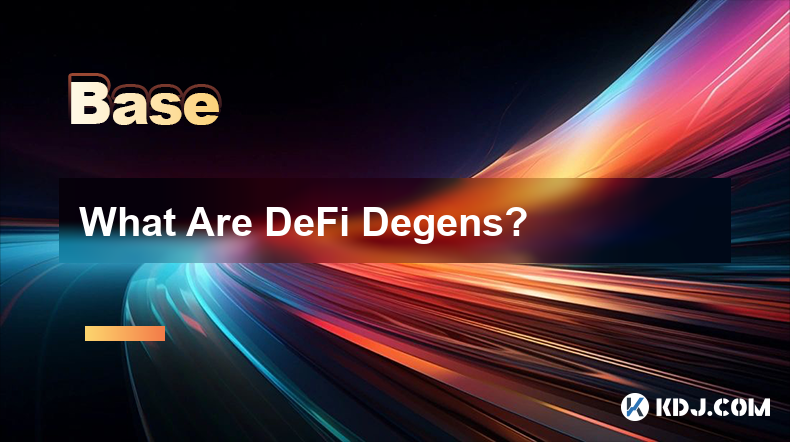
Key Points:
- Definition and characteristics of DeFi degens.
- Benefits and risks associated with DeFi degen activities.
- Common strategies employed by DeFi degens.
- How to identify and avoid DeFi rug pulls and scams.
- Regulations and legal implications for DeFi degens.
- Ethical considerations for DeFi degens.
- Future prospects for DeFi degens.
DeFi Degens: A Comprehensive Guide
1. Definition and Characteristics of DeFi Degens
DeFi degens, short for decentralized finance degenerates, are a unique group of cryptocurrency enthusiasts who engage in speculative and high-risk trading within the DeFi ecosystem. Driven by a pursuit of high returns and a willingness to take on significant leverage, they employ a range of strategies to maximize their potential profits.
Common characteristics of DeFi degens include:
- High Risk Tolerance: Degens are willing to accept substantial losses in pursuit of outsized gains.
- Leverage Enthusiasts: They often use borrowed funds to amplify their returns, increasing their exposure to both potential profits and losses.
- Technical Proficiency: Degens possess a deep understanding of DeFi protocols and underlying blockchain technology.
- Community-Oriented: They actively engage in online communities, such as Discord and Telegram, to share information and coordinate trading strategies.
2. Benefits and Risks Associated with DeFi Degen Activities
Benefits:
- Potential for High Returns: DeFi offers a wide range of high-yielding investment opportunities, such as yield farming, liquidity mining, and staking.
- Decentralization and Autonomy: DeFi protocols operate on decentralized blockchains, providing traders with greater control over their assets and trading decisions.
- Access to Emerging Projects: DeFi degens have early access to innovative DeFi projects, increasing the potential for substantial gains.
Risks:
- Volatility and Impermanent Loss: DeFi markets can be highly volatile, leading to rapid price swings and significant losses.
- Smart Contract Vulnerabilities: DeFi protocols can be subject to exploits and hacks, jeopardizing the safety of user funds.
- Rug Pulls and Scams: Degens face a constant threat of losing their investments to malicious actors who create fraudulent projects and abscond with funds.
3. Common Strategies Employed by DeFi Degens
- Yield Farming: Utilizing liquidity pools to earn interest on deposited crypto assets.
- Liquidity Mining: Providing liquidity to decentralized exchanges (DEXs) in exchange for rewards.
- Staking: Holding crypto assets in a designated wallet to earn passive income and secure the network.
- Leverage Trading: Using borrowed funds to magnify profits (and losses) in various DeFi protocols.
- Arbitrage Trading: Exploiting price discrepancies across different DeFi platforms to generate quick profits.
4. How to Identify and Avoid DeFi Rug Pulls and Scams
- Research the Project: Thoroughly investigate the team behind the project, their experience, and the whitepaper outlining the technology and use cases.
- Check Liquidity: Ensure the project has sufficient liquidity to cover potential withdrawals, reducing the risk of a liquidity crisis.
- Review Smart Contracts: Audit the smart contracts underlying the project to identify any potential vulnerabilities or red flags.
- Monitor Social Media: Stay informed about any negative news, community concerns, or questionable activity related to the project.
- Trust Your Instincts: If something seems too good to be true, it likely is. Be cautious of projects promising unrealistic returns or making overly ambitious claims.
5. Regulations and Legal Implications for DeFi Degens
The regulatory landscape for DeFi is still evolving, but governments worldwide are beginning to take notice of the growing industry.
- Regulatory Scrutiny: DeFi degens may face anti-money laundering (AML) and know-your-customer (KYC) regulations to combat illicit activities.
- Legal Liabilities: Degens may be held liable for any losses incurred as a result of their participation in DeFi protocols, including smart contract failures or malicious attacks.
- Tax Implications: Cryptocurrencies, including those used in DeFi, are generally subject to taxation in many jurisdictions. Degens should consult with a qualified tax professional to understand their obligations.
6. Ethical Considerations for DeFi Degens
- Responsible Investing: Degens should exercise caution and invest only what they can afford to lose.
- Avoid Market Manipulation: Engaging in unethical practices, such as wash trading or pump-and-dump schemes, undermines the integrity of the DeFi ecosystem.
- Support Sustainable Projects: Degens should prioritize investing in projects that demonstrate a commitment to innovation, security, and community growth.
7. Future Prospects for DeFi Degens
The future of DeFi degens remains uncertain but holds immense potential.
- Continued Innovation: The DeFi ecosystem is constantly evolving, presenting new opportunities for degens to explore and capitalize on.
- Increased Adoption: As DeFi becomes more mainstream, new users will enter the market, providing degens with greater liquidity and trading volume.
- Regulatory Clarity: As regulations develop, the industry will become more transparent and secure, benefiting all participants, including degens.
Disclaimer:info@kdj.com
The information provided is not trading advice. kdj.com does not assume any responsibility for any investments made based on the information provided in this article. Cryptocurrencies are highly volatile and it is highly recommended that you invest with caution after thorough research!
If you believe that the content used on this website infringes your copyright, please contact us immediately (info@kdj.com) and we will delete it promptly.
- Grayscale Makes Waves in the Cryptocurrency World with Dogecoin ETF Filing
- 2025-02-02 18:00:57
- Tether (USDT) Integrates With Bitcoin (BTC) and the Lightning Network (LN)
- 2025-02-02 18:00:57
- XRP Ledger: A Sustainable and Scalable Alternative to Bitcoin's Proof of Work
- 2025-02-02 17:50:57
- XRP: A Symbol of the Unpredictable Cryptocurrency Market
- 2025-02-02 17:50:57
- Tether Reports Record $13 Billion Profit for 2024, Bitcoin and Gold Holdings Surge
- 2025-02-02 17:50:57
- Dogecoin ($DOGE) Surges Amid Whale Activity, Grayscale Plans to Convert Trust Into an ETF
- 2025-02-02 17:40:57
Related knowledge
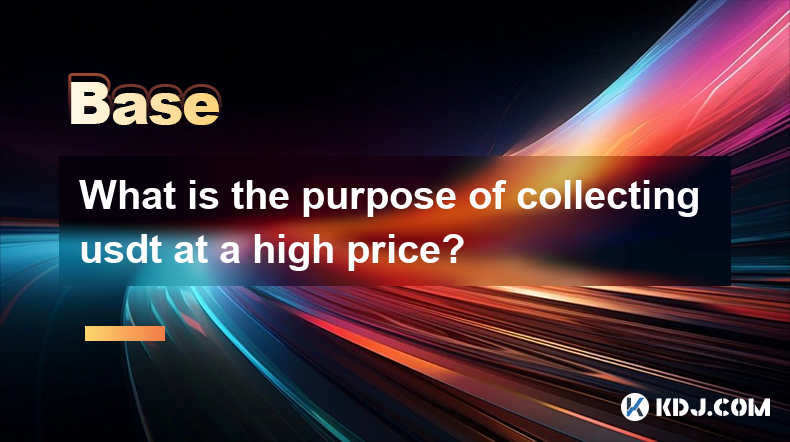
What is the purpose of collecting usdt at a high price?
Jan 24,2025 at 01:12pm
Key Points of the Article:Understanding the motivations behind USDT accumulation at a premiumExploring the potential consequences and risks of this strategyAnalyzing the long-term viability and sustainability of USDT accumulationIdentifying alternative approaches to USDT acquisitionUnderstanding the Purpose of USDT Accumulation at a High PriceMarket Man...
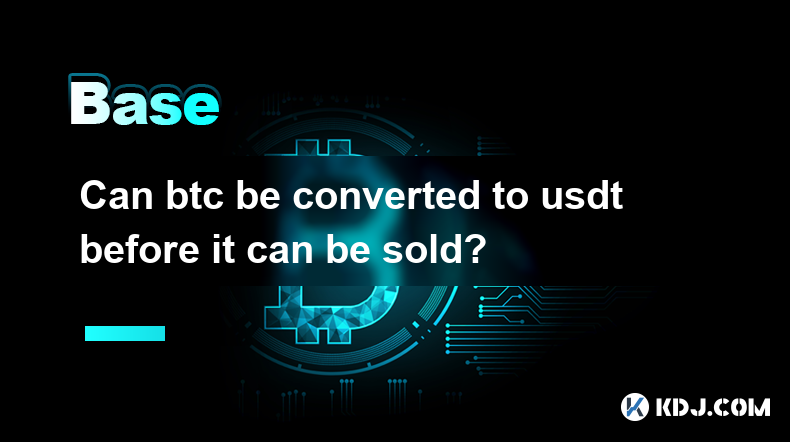
Can btc be converted to usdt before it can be sold?
Jan 28,2025 at 07:12am
Can BTC be Converted to USDT Before It Can Be Sold?Key Points:Understand the nature of BTC and USDT.Explore the conversion process from BTC to USDT with different platforms.Examine the potential advantages and drawbacks of converting BTC to USDT before selling.What are BTC and USDT?BTC (Bitcoin): A decentralized, peer-to-peer digital currency with limit...
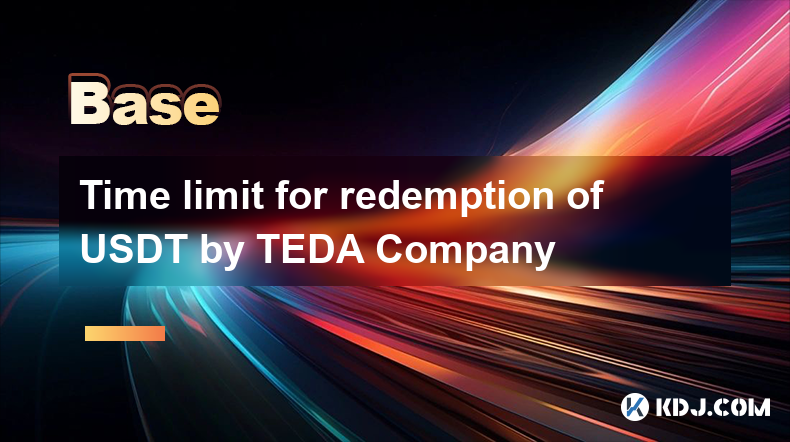
Time limit for redemption of USDT by TEDA Company
Jan 24,2025 at 10:01pm
Time Limit for Redemption of USDT by TEDA CompanyKey Points:TEDA Company's USDT redemption time limitImplications of the time limitSteps to redeem USDT within the time limitFAQs on USDT redemption by TEDA CompanyTime Limit for USDT Redemption by TEDA CompanyTEDA Company, a major cryptocurrency exchange in China, has imposed a time limit on the redemptio...
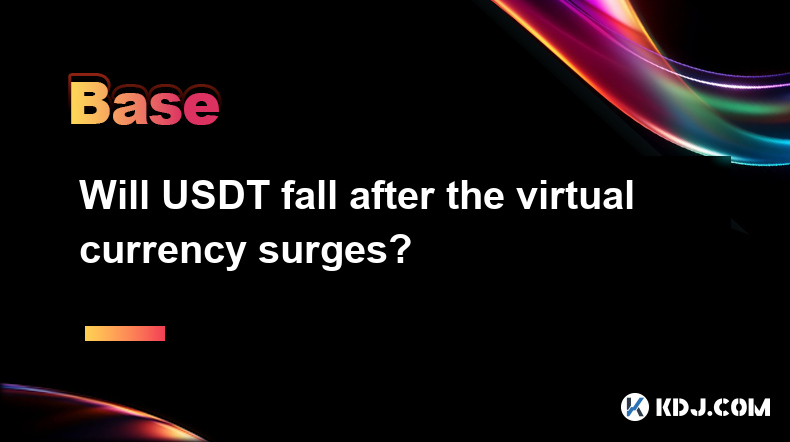
Will USDT fall after the virtual currency surges?
Jan 30,2025 at 05:54am
Key PointsUnderstanding Tether's Stability and the Factors Influencing itAnalyzing Crypto Market Dynamics and their Impact on USDT PriceAssessing the Role of Market Sentiment in USDT's PerformanceExamining Regulations and Legal Considerations Affecting USDTExploring Potential Risks and Mitigating StrategiesWill USDT Fall after the Virtual Currency Surge...
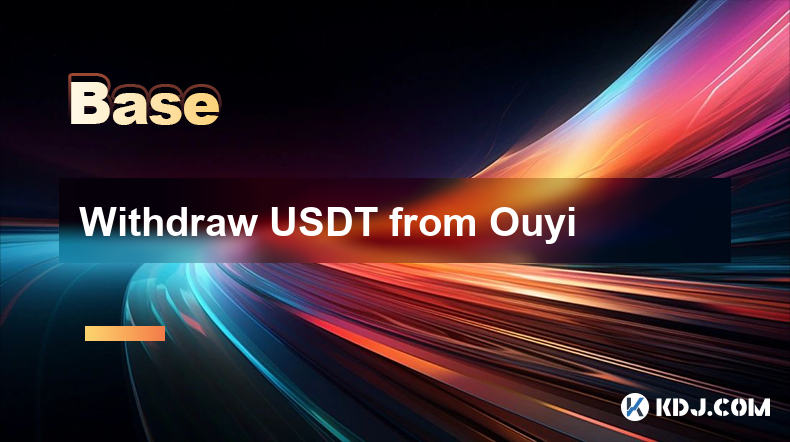
Withdraw USDT from Ouyi
Jan 24,2025 at 01:31pm
How to Withdraw USDT from OuyiKey Points:Log into your Ouyi account.Navigate to the "Assets" tab.Select "USDT" from the list of currencies.Click "Withdraw."Enter the recipient's wallet address.Enter the amount of USDT you wish to withdraw.Select the withdrawal network (e.g., TRC-20, ERC-20).Review the withdrawal details and confirm the transaction.Step-...
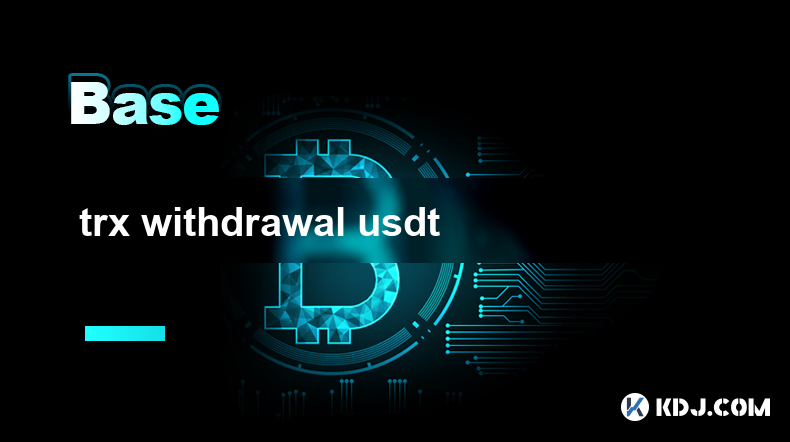
trx withdrawal usdt
Jan 25,2025 at 05:30pm
TRX Withdrawal USDT: A Comprehensive Guide to Withdrawing TRX from USDT Accounts on Popular Cryptocurrency ExchangesKey PointsA step-by-step guide to withdrawing TRX from USDT accounts on leading cryptocurrency exchanges.Insights into choosing the best exchange for TRX withdrawal to optimize fees and security.Security measures and best practices for pro...

What is the purpose of collecting usdt at a high price?
Jan 24,2025 at 01:12pm
Key Points of the Article:Understanding the motivations behind USDT accumulation at a premiumExploring the potential consequences and risks of this strategyAnalyzing the long-term viability and sustainability of USDT accumulationIdentifying alternative approaches to USDT acquisitionUnderstanding the Purpose of USDT Accumulation at a High PriceMarket Man...

Can btc be converted to usdt before it can be sold?
Jan 28,2025 at 07:12am
Can BTC be Converted to USDT Before It Can Be Sold?Key Points:Understand the nature of BTC and USDT.Explore the conversion process from BTC to USDT with different platforms.Examine the potential advantages and drawbacks of converting BTC to USDT before selling.What are BTC and USDT?BTC (Bitcoin): A decentralized, peer-to-peer digital currency with limit...

Time limit for redemption of USDT by TEDA Company
Jan 24,2025 at 10:01pm
Time Limit for Redemption of USDT by TEDA CompanyKey Points:TEDA Company's USDT redemption time limitImplications of the time limitSteps to redeem USDT within the time limitFAQs on USDT redemption by TEDA CompanyTime Limit for USDT Redemption by TEDA CompanyTEDA Company, a major cryptocurrency exchange in China, has imposed a time limit on the redemptio...

Will USDT fall after the virtual currency surges?
Jan 30,2025 at 05:54am
Key PointsUnderstanding Tether's Stability and the Factors Influencing itAnalyzing Crypto Market Dynamics and their Impact on USDT PriceAssessing the Role of Market Sentiment in USDT's PerformanceExamining Regulations and Legal Considerations Affecting USDTExploring Potential Risks and Mitigating StrategiesWill USDT Fall after the Virtual Currency Surge...

Withdraw USDT from Ouyi
Jan 24,2025 at 01:31pm
How to Withdraw USDT from OuyiKey Points:Log into your Ouyi account.Navigate to the "Assets" tab.Select "USDT" from the list of currencies.Click "Withdraw."Enter the recipient's wallet address.Enter the amount of USDT you wish to withdraw.Select the withdrawal network (e.g., TRC-20, ERC-20).Review the withdrawal details and confirm the transaction.Step-...

trx withdrawal usdt
Jan 25,2025 at 05:30pm
TRX Withdrawal USDT: A Comprehensive Guide to Withdrawing TRX from USDT Accounts on Popular Cryptocurrency ExchangesKey PointsA step-by-step guide to withdrawing TRX from USDT accounts on leading cryptocurrency exchanges.Insights into choosing the best exchange for TRX withdrawal to optimize fees and security.Security measures and best practices for pro...
See all articles
























































































